牛津英语八年级英语上知识点
牛津译林版八年级英语上册全册知识点归纳总结
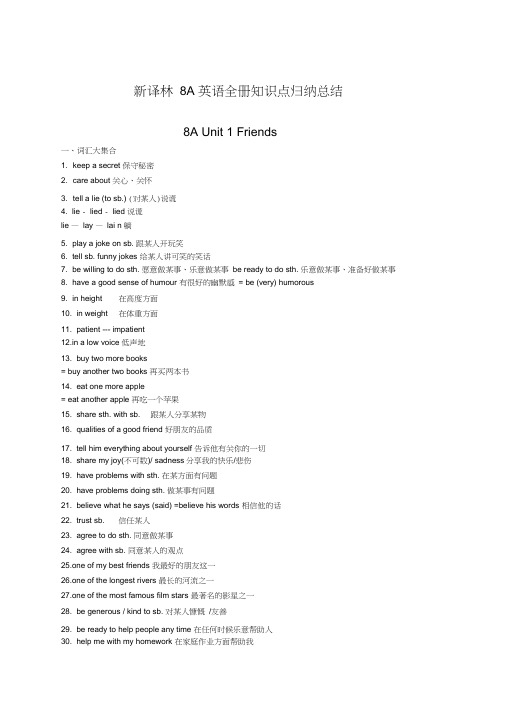
新译林8A 英语全册知识点归纳总结8A Unit 1 Friends一、词汇大集合1. keep a secret 保守秘密2. care about 关心、关怀3. tell a lie (to sb.) (对某人)说谎4. lie - lied - lied 说谎lie —lay —lai n 躺5. play a joke on sb. 跟某人开玩笑6. tell sb. funny jokes 给某人讲可笑的笑话7. be willing to do sth. 愿意做某事、乐意做某事be ready to do sth. 乐意做某事、准备好做某事8. have a good sense of humour 有很好的幽默感= be (very) humorous9. in height 在高度方面10. in weight 在体重方面11. patient --- impatient12.in a low voice 低声地13. buy two more books= buy another two books 再买两本书14. eat one more apple= eat another apple 再吃一个苹果15. share sth. with sb. 跟某人分享某物16. qualities of a good friend 好朋友的品质17. tell him everything about yourself 告诉他有关你的一切18. share my joy(不可数)/ sadness分享我的快乐/悲伤19. have problems with sth. 在某方面有问题20. have problems doing sth. 做某事有问题21. believe what he says (said) =believe his words 相信他的话22. trust sb. 信任某人23. agree to do sth. 同意做某事24. agree with sb. 同意某人的观点25.one of my best friends 我最好的朋友这一26.one of the longest rivers 最长的河流之一27.one of the most famous film stars 最著名的影星之一28. be generous / kind to sb. 对某人慷慨/友善29. be ready to help people any time 在任何时候乐意帮助人30. help me with my homework 在家庭作业方面帮助我31. give a seat on the bus to someone in need 在公交车上让座给有需要的人32. h ave a good/sweet voice 有个好 / 甜美的嗓音 33. w ear small round glasses 戴小小的圆框眼镜 34. m ake him look smart 使他看起来精干35. never feel bored with him 和他一起从不感到无聊 36. a boring film 一部无聊的电影37. make me thirsty 使我口渴 make sb. / sth.+adj. make me laugh 使我大笑 make sb. do sth. 38. walk past our desks=pass our desks 从我们桌子旁边经过 39. kn ock ...o nto the grou nd 把…撞到地上 knock over 撞翻 ,碰倒knock …off …把…从…上撞下来40. so interesting 如此有趣41. have big bright eyes 有双明亮的大眼睛 42. have/wear long straight hair 留长直头发 43. say a bad word about sb.=say bad things about sb. 说某人的坏话 44. a true friend一个真诚的朋友45. sth. worry sb. 某事困扰某人46. sb. be worried about sth. 某人担心某事47. choose sb. as /(to be) your best friend 选择某人作为你最好的朋友48. look smart in his small round glasses 戴着他的小圆框眼镜看起来帅 49.listen to people carefully 认真听人们倾诉50. help people with their problems 帮人们解决问题 51. make friends with sb. 跟某人交朋友 52. among the six students 在六名学生当中53. among all the Chinese artists 在所有的中国艺术家当中 54. talk about our future plans 谈论我们的未来计划 55. a small girl with a ponytail 一个扎马尾辫的女孩 55. a boy with / wearing glasses 一个戴着眼镜的男孩 56. both .... and ….. 既…又…57. b e/ make / become an excellent teacher 成为一名优秀的教师 58. feel bored or unhappy 感觉无聊或不开心59.like her bright smiling eyes 喜欢她明亮略带微笑的眼睛 60. w ear/have a smile on one 's face 面带微笑 二、句型大集合 1. Can I have something to drink? 2. Can I have some more food? 3. There is nothing in the fridge.冰箱里什么也没有。
牛津译林版八年级英语全册语法知识点总结

1.句子结构:a.主语+谓语+宾语b.主语+谓语+间接宾语+直接宾语c.主语+谓语+宾语+宾语补足语d.主语+谓语+宾语+宾语补足语+定语e.主语+系动词+表语f.主语+不及物动词2.时态:a.一般现在时:表示现在经常性、习惯性的动作或状态。
b.现在进行时:表示现在正在进行的动作。
c.一般过去时:表示过去发生的动作或状态。
d.过去进行时:表示过去其中一时刻正在进行的动作。
e.一般将来时:表示将来的动作或状态。
f.将来进行时:表示将来其中一时刻正在进行的动作。
3.语态:a.主动语态:主语是动作的执行者。
b.被动语态:主语是动作的承受者。
4.动词时态和语态的被动形式:a. 一般现在时的被动形式:am/is/are+动词的过去分词。
b. 一般过去时的被动形式:was/were+动词的过去分词。
c. 将来时的被动形式:will be+动词的过去分词。
d. 现在进行时的被动形式:am/is/are+being+动词的过去分词。
e. 过去进行时的被动形式:was/were+being+动词的过去分词。
5.情态动词:a. can:表示能力、允许和请求。
b. may:表示许可、可能性和祝愿。
c. must:表示肯定、必要性和推测。
d. should:表示建议、责任和承诺。
e. might:表示推测、可能和祝愿。
f. would:表示假设、请求和习惯。
6.虚拟语气:a.虚拟语气用于表达虚构、假设、愿望、建议等。
b. 虚拟语气主要涉及以下几个时态:一般过去时、现在将来时、与现在相对的过去将来时、would/could+动词原形。
7.上文一致性:a.当主句用一般现在时态表述,宾语从句中的谓语动词将会保持不变。
b.当主句用过去时态表述,宾语从句中的谓语动词将用相应的过去时态。
总结完毕,以上是牛津译林版八年级英语全册所涉及的主要语法知识点。
八年级上册英语牛津版笔记

八年级上册英语牛津版笔记以下是八年级上册牛津版英语的学习笔记:Unit 1:现在和过去1. 现在进行时(Present Continuous Tense):表示正在进行的动作或正在发生的情境。
结构为“be动词+动词-ing”。
例如:I am studying English。
2. 现在完成时(Present Perfect Tense):表示已经完成的动作或已经发生的情境。
结构为“have/has+过去分词”。
例如:I have studied English for two years。
3. 一般过去时(Simple Past Tense):表示过去某个时间点的动作或情境。
结构为“动词的过去式”。
例如:I studied English last year。
4. 过去进行时(Past Continuous Tense):表示过去某个时间点正在进行的动作。
结构为“was/were+动词-ing”。
例如:I was studying English at 10 o’clock yesterday。
5. 过去完成时(Past Perfect Tense):表示在过去某个时间点之前已经完成的动作。
结构为“had+过去分词”。
例如:I had studied English before I came to the UK。
Unit 2:频率和频率副词1. 频率副词(Frequency Adverbs):表示动作发生的频率,如always、usually、often、sometimes、never等。
2. 表示频率的句型:“How often do you/does sb. do sth.?”例如:“How often do you go to the cinema?”3. 表示频率的单词和短语:once a week、twice a month、three times a year等。
Unit 3:将来时间1. 一般将来时(Simple Future Tense):表示将来某个时间点将要发生的动作或情境。
Unit2知识点梳理牛津译林版八年级英语上册
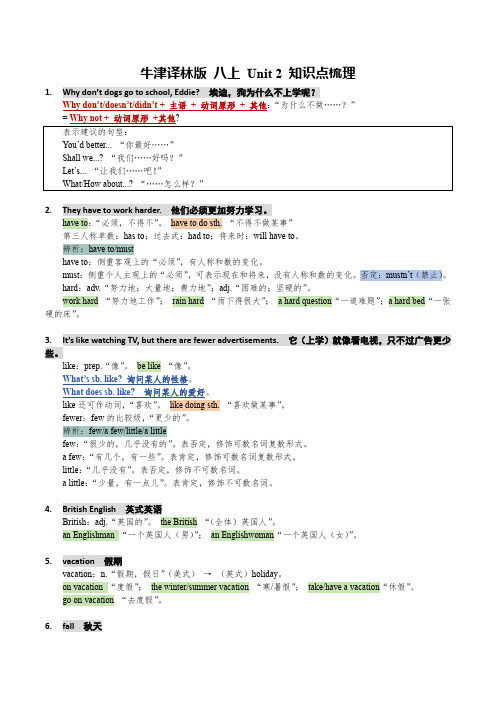
牛津译林版八上Unit 2 知识点梳理1.Why don’t dogs go to school, Eddie? 埃迪,狗为什么不上学呢?Why don’t/doesn’t/didn’t + 主语+ 动词原形+ 其他:“为什么不做……?”2.They have to work harder. 他们必须更加努力学习。
have to:“必须,不得不”。
have to do sth. “不得不做某事”第三人称单数:has to;过去式:had to;将来时:will have to。
辨析:have to/musthave to:侧重客观上的“必须”,有人称和数的变化。
must:侧重个人主观上的“必须”,可表示现在和将来,没有人称和数的变化。
否定:mustn’t(禁止)。
hard:adv.“努力地;大量地;费力地”;adj.“困难的;坚硬的”。
work hard “努力地工作”;rain hard “雨下得很大”;a hard question“一道难题”;a hard bed“一张硬的床”。
3.It’s like watching TV, but there are fewer advertisements. 它(上学)就像看电视,只不过广告更少些。
like:prep.“像”。
be like “像”。
What’s sb. like? 询问某人的性格。
“喜欢做某事”。
fewer:few的比较级,“更少的”。
辨析:few/a few/little/a littlefew:“很少的,几乎没有的”。
表否定,修饰可数名词复数形式。
a few:“有几个,有一些”。
表肯定,修饰可数名词复数形式。
little:“几乎没有”。
表否定,修饰不可数名词。
a little:“少量,有一点儿”。
表肯定,修饰不可数名词。
4.British English 英式英语British:adj.“英国的”。
the British “(全体)英国人”。
牛津深圳版八年级上册英语期末复习各单元重点知识提纲

牛津深圳版八年级上册英语期末复习各单元重点知识提纲Unit 1: School Life- Vocabulary: school subjects, activities, and facilities- Grammar: present simple tense, adverbs of frequency, and prepositions of placeUnit 2: Family Life- Vocabulary: family members, relationships, and daily routines- Grammar: present continuous tense, possessive determiners, and question wordsUnit 3: My Friends- Vocabulary: describing personality and appearance, hobbies, and interestsUnit 4: Leisure Time- Vocabulary: sports and leisure activities, places, and equipment- Grammar: past simple tense, adverbs of time, expressions for giving opinionsUnit 5: Food and Health- Vocabulary: food and drinks, eating habits, and health problems - Grammar: present perfect tense, for and since, quantifiersUnit 6: Clothes and Shopping- Vocabulary: clothing items, colors, and fashion accessories- Grammar: be going to for future plans, imperative sentences, expressions for making suggestionsUnit 7: Festivals and Celebrations- Vocabulary: traditional festivals, customs, and celebrations- Grammar: would like for polite requests, past continuous tense, expressions for giving adviceUnit 8: Travel and Transport- Vocabulary: places to visit, means of transport, and travel essentials- Grammar: future forms (will, be going to, present continuous), expressions for making predictionsUnit 9: Science and Technology- Vocabulary: inventions, technological advancements, and scientific concepts- Grammar: present perfect continuous tense, passive voice, expressions for speculatingUnit 10: Environment and Sustainability- Vocabulary: environmental issues, natural resources, and ways to protect the environment- Grammar: second conditional, should/shouldn't for advice, expressions for expressing opinions语法要点复- Present simple tense: 表示经常性的动作或常理情况- Present continuous tense: 表示现在正在进行的动作- Past simple tense: 表示过去发生的动作或状态- Present perfect tense: 表示过去发生的动作对现在的影响或结果- Be going to: 表示计划或打算要做的事情- Would like: 表示礼貌地请求或表达愿望- Should/shouldn't: 表示建议或应该做或不应该做的事情- Passive voice: 表示动作的承受者重要于动作的执行者- Imperative sentences: 表示命令、请求或建议- Expressions for giving opinions, advice, suggestions, making predictions, and speculating: 用于表达观点、建议、建议、预测和推测的表达方式以上是牛津深圳版八年级上册英语的各单元重点知识提纲。
牛津英语八年级英语上知识点

8A Unit 1 Friends1. PassageKate is both my best friend and my neighbour. She lives next door. I got to know her ten years ago. Kate is tall and slim. She has square face and a long nose. I like her bright, smiling eyes. They make her look really pretty and kind. She has long hair.Kate is a very clever girl and she likes to help people. She always helps me with my homework. When I feel bored or happy, she talks to me and tells me funny jokes. She always wears a smile on her face and looks happy.2. Word and phrase1)have sth. to drink喝点东西have sth. to eat吃点东西例:If you are thirsty, have something to drink.如果你渴了,就喝点什么吧。
Do you want to have something to drink now你现在想吃点东西吗/2)make sb.+adj. 表示使某人(怎样)make sb. special:使某人特别例:This song makes him really sad.这首歌使他很悲伤He can always make me happy.他总能让我高兴。
3)get to do sth. 有机会做某事例:Betty and I may not get to see each other often but we will always be best friends.贝蒂和我也学没有机会经常见面,但我们将永远是最好的朋友。
牛津译林版八年级英语上册Unit6知识点归纳
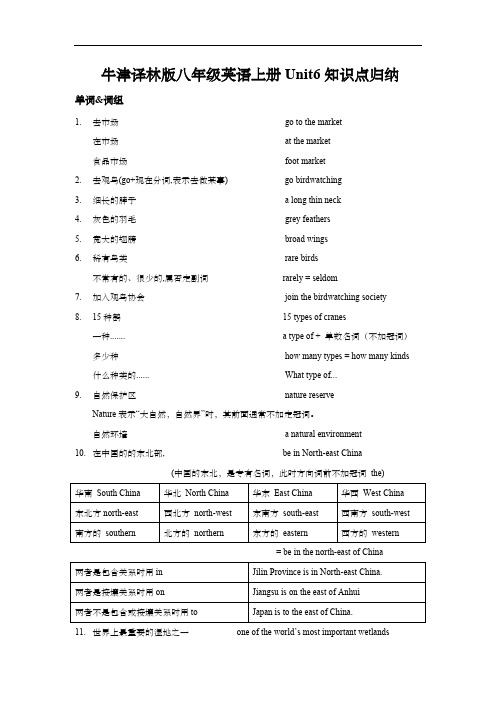
牛津译林版八年级英语上册Unit6知识点归纳单词&词组1.去市场go to the market在市场at the market食品市场foot market2.去观鸟(go+现在分词,表示去做某事) go birdwatching3.细长的脖子 a long thin neck4.灰色的羽毛grey feathers5.宽大的翅膀broad wings6.稀有鸟类rare birds不常有的、很少的,属否定副词rarely = seldom7.加入观鸟协会join the birdwatching society8.15种鹤15 types of cranes一种....... a type of + 单数名词(不加冠词)多少种how many types = how many kinds 什么种类的...... What type of...9.自然保护区nature reserveNature表示“大自然,自然界”时,其前面通常不加定冠词。
自然环境 a natural environment10.在中国的的东北部, be in North-east China(中国的东北,是专有名词,此时方向词前不加冠词the)华南South China华北North China华东East China华西West China 东北方north-east西北方north-west东南方south-east西南方south-west 南方的southern北方的northern东方的eastern西方的western= be in the north-east of China两者是包含关系时用in Jilin Province is in North-east China.两者是接壤关系时用on Jiangsu is on the east of Anhui两者不是包含或接壤关系时用to Japan is to the east of China.11.世界上最重要的湿地之一one of the world’s most important wetlands= one of the most important wetlands in the world 12.为……提供食物和庇护所provide food and cover for sb= provide sb with food and coverprovide sth for sb = provide sb with sth为某人提供某物Give sb sth = give sth to sbOffer sb sth = offer sth to sbSupply sb with sth = supply sth to sb13.孰能生巧。
牛津译林版八年级英语上册Unit1知识点讲解

牛津译林版八年级英语上册Unit1知识点讲解牛津译林版八年级英语上册Unit1知识点讲解重点单词清单1. thirsty /形adj.口渴的典例I'm so thirsty. Can I get something to drink?我如此口渴。
我可以要点儿喝的吗?拓展thirsty的比较级是thirstier, 最高级是thirstiest。
honest/形adj.诚实的;正直的助记诚实的猴[ ho(u) ]待在鸟巢( nest)里。
典例an honest boy一个诚实的男孩反义: dishonest adj.不诚实的,不正直的拓展honest是以元音音素开头的单词,前面用不定冠词an。
联想honesty n.诚实,正直secret /名n.秘密典例I can’t tell you that. It’s a secret.我不能告诉你那件事。
它是个秘密。
短语* keep a secret保守秘密in secret秘密地,暗地里拓展secret adj. 秘密的care/动vi.& vt.关心,关注,在意典例:I don't care much about going to the party.我不太在意去参加那个晚会。
短语>care for 照料;喜欢care about 关心;关怀联想care n. 照管;管理;看护;小心;留神take care of照料,关怀yourself /代pron.你自己助记your( pron.你的)+self(n.自己)= yourself典例Help yourself to some fish, Ann.安,请随便吃些鱼吧。
短语*enjoy yourself玩得开心by yourself独自地,独立地help yourself to... 请随便吃拓展yourself的复数形式为yourselves.6.magazine/n.杂志典例read many kinds of magazines拓展英语中“看”的不同表达(看书read a book看电影see/ watch a film看电视watch TV看黑板look at the blackboard看医生see the doctor看窗外look out of the window7. good-looking /形adj.好看的,漂亮的助记> good( adj.好的) +looking( adj.●.....相貌的)= good-looking典例>Lucy is a good-looking girl.露西是-个漂亮的姑娘。
Unit3-Unit4知识点归纳牛津译林版英语八年级上册

U3知识归纳1.主格作主语, 宾格作表语或动词或介词的宾语.He teaches _____(we) Chinese . / I’m waiting for you.(介词的宾语) / It’s me.(宾格做表语)2.三种人称代词并列充当主语时时,顺序为:单数:(二,三,一)——(You, she and I )复数:(一,二,三)——(we , you and they )注::若把责任担,第一人称最当先,(即若做错事时,把第一人称放在最前面.)eg:She and I have been to Beijing .(一般情况)Who broke the window ? I and Mike .(承担责任)3.it 的特殊用法①it可指不知性别的婴儿或不确指性别的人.who is the person over there?— it is the headmaster.②It也可用来表示天气、时间、距离等。
1)天气: How cold it is today!2)时间: It's about eight o'clock.3)距离: It's 200 kilometers from here.③it做形式主语、形式宾语,常用于句型“It’s +adj +(for sb./ of sb.)to do sth”;It takes sb st to do sth. 花费时间做某事1、形容词性物主代词作定语修饰名词,一般不单独使用. eg: My name is Tom.( 形容词性物主代词)2、名词性物主代词,后面不能加名词,名词性物主代词常与of 连用, 如He is a friend of minee.g. Our classroom is as big as ______(they) . / This is a friend of ______(my).名词性物主代词=形容词性物主代词+ 名词(上题中mine=my friends)【练习】用正确的人称代词/物主代词填空1. My aunt is a teacher. _______ is nice to her students.2. Tom and I are in the same school, but _______ aren’t in the same class.3. —Hi, David. How are _______ ? —Fine, thank you.4. —Here is some news. —Is _______ good?5. David and Kitty go to school together because _______ live near each other.6. My name is Kitty and _______ live in Nanjing.7. Where is your fa ther? I can’t find _______ anywhere.8. Mr. Wu and his students are over there. Now _______ is talking to _______.9. Mr. Gao teaches ________ Maths and we all like _______ lessons.10.Tom and I are good friends._______ often help each other.U4知识归纳一、表示时间的介词at,in,on用法辨析1. in的用法1)用于一天的早、中、晚前。
牛津译林版八年级上英语知识点总结
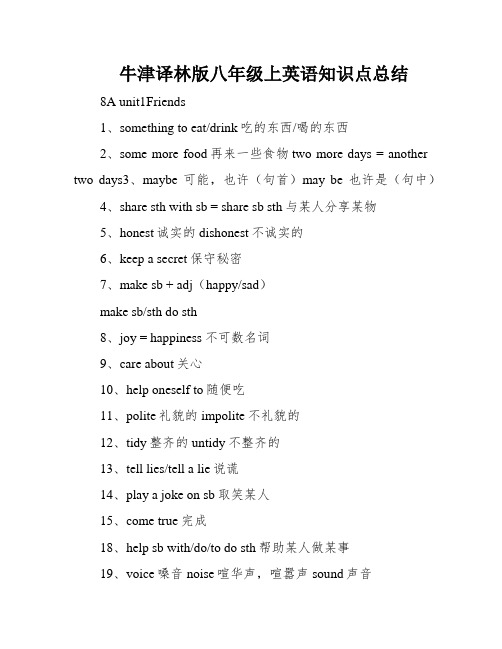
牛津译林版八年级上英语知识点总结8A unit1Friends1、something to eat/drink吃的东西/喝的东西2、some more food再来一些食物two more days = another two days3、maybe可能,也许(句首)may be也许是(句中)4、share sth with sb = share sb sth与某人分享某物5、honest诚实的dishonest不诚实的6、keep a secret保守秘密7、make sb + adj(happy/sad)make sb/sth do sth8、joy = happiness不可数名词9、care about关心10、help oneself to随便吃11、polite礼貌的impolite不礼貌的12、tidy整齐的untidy不整齐的13、tell lies/tell a lie说谎14、play a joke on sb取笑某人15、come true完成18、help sb with/do/to do sth帮助某人做某事19、voice嗓音noise喧华声,喧嚣声sound声音20、a sense of humour幽默感21、knock into sb撞在某人身上22、choose to do sth选择做某事23、height高度adj为high高的put on weight增肥lose weight减肥25、among强调在三者或三者以上之间26、plan to do sth计划做某事27、what’s sb like?用于讯问或人的性情、品质等what does sb like?用于询问某人的喜好what does sb look like?用于询问某人的外貌28、with带有,具有29、fat----- fatter------fattest30、patient耐心的impatient不耐心的31、in need需要32、be kind to sb对某人友好33、any time在任何时候34、knock..onto把...撞....35、say a bad word about sb.说某人的坏话36、talk about谈论37、social worker社会工作者38、grow up长大,成长39、next to挨着40、What about +n./v. -ing? (做) ...怎.么样?41、be good at+n./v.-ing擅长(做)某事42、would like to do sth.想做某事18A unit2 School life1、have to不能不、必需三单方式:has to曩昔时态:had to未来时态:will have to2、hard努力地比力级harderIt’s raining hard. Hard意为大量地、辛苦地3、a little大批,一点儿透露表现一定意义little很少,几乎没有表示否定意义a few有几个,有一些透露表现一定意义few没有几个,几乎没有表示否定意义4、go on vacation去度假5、提发起的经常使用句型:①Could/Would you please do sth.?请你做某事好吗?②Shall we/I do sth.?我们/我做某事好吗?③Let's do sth.咱们做某事吧。
Unit2重要知识点牛津译林版英语八年级上册

8A U2【wele】1.have to &must[have to]:“必须,不得不”,强调客观上的需要,有人称,时态的变化(三单has to,过去式had to,将来时will have to),其否定形式为don't/doesn’t/didn’t have to,表示“不必”[must]:“必须”,强调主观意愿和看法,无人称,时态和数的变化,其否定形式为mustn't,表示“禁止,不允许”2.It's like watching TV,but there are fewer advertisements.它(上学)就像看电视,只不过广告少一些。
①like prep.像... +名词/代词/ving②fewfewer +可名复③few ;a few;little;a little区别3.British n.英国人the British=British people=Englishmanadj.英国的British people4.vacation 可数名词/不可数名词“假期”(英:holiday)on vacation在度假take a vacation度假winter/summer vacation寒假/暑假5.fall n秋天(英:Autumn);瀑布vi.落下;跌倒6.movie n.(可数) 电影(英:film)go to a movie/go to the movie看电影6.Shall we go together?“Shall we do......?”提建议的句型➡肯定回答:Why not?/OK./Of course./All right.【提建议的句型】Let’s do sth.You'd better do sth.(你最好做某事)How/What about doing sth?Why not do sth?Why don’t you do sth?Will/Would/Could you please do sth?(请你做下某事好吗?)7.practise vi/vt. 练习,训练practise (doing) sth (英:practise)n.练习(英:practice)【reading】1.in year 8在八年级(英:in Grade 8)在...年级:美in Year +基数词in the +序数词+year英in Grade +基数词in the+序数词+grade2.mix vt.混合➡mixed adj.混合的➡mixture n.混合物3.Among all my subjects,I like French best.①like...best=favourite②France n.法国➡French ①n.法语②adj法国的Frenchman法国人4.Learning foreign language is fun.①learning foreign language 动名词短语,起名词作用(指学外语这件事),后面的谓语动词用单数。
牛津版八年级英语上册语法知识点总结
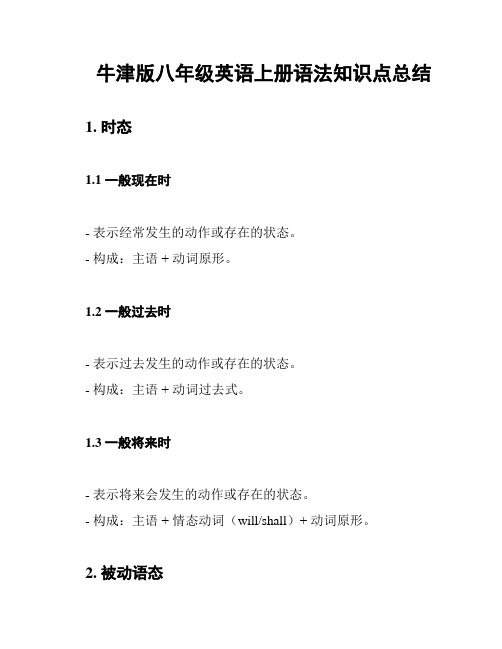
牛津版八年级英语上册语法知识点总结1. 时态1.1 一般现在时- 表示经常发生的动作或存在的状态。
- 构成:主语 + 动词原形。
1.2 一般过去时- 表示过去发生的动作或存在的状态。
- 构成:主语 + 动词过去式。
1.3 一般将来时- 表示将来会发生的动作或存在的状态。
- 构成:主语 + 情态动词(will/shall)+ 动词原形。
2. 被动语态2.1 被动语态的构成- 一般现在时:主语 + am/is/are + 过去分词。
- 一般过去时:主语 + was/were + 过去分词。
- 一般将来时:主语 + will be + 过去分词。
2.2 被动语态的用法- 强调动作的承受者。
- 表示动作的执行者不重要或未知。
3. 情态动词3.1 情态动词的用法- can表示能力或可能性。
- may表示请求或允许。
- must表示肯定推测或强制。
- should表示应该或建议。
- shall表示承诺或警告。
- will表示意愿或将来时。
3.2 情态动词的辨析- can和may表示可能性,但can表示能力时不能用may替换。
- must表示肯定推测时,后句用否定形式;表示强制时,后句用肯定形式。
- shall和will表示意愿,但shall用于第一人称,will用于第三人称。
4. 句子结构4.1 简单句- 包含一个主语和一个谓语。
- 例如:The cat sleeps.4.2 并列句- 包含两个或多个主语和谓语,用并列连词连接。
- 例如:The cat sleeps, and the dog barks.4.3 复合句- 包含一个主句和一个或多个从句。
- 例如:The cat sleeps when the sun sets.4.4 复杂句- 包含一个主句和两个或多个从句。
- 例如:The cat sleeps when the sun sets, and the dog barks at night.5. 疑问句5.1 一般疑问句- 采用倒装结构,将助动词或情态动词移至主语前。
牛津译林八年级上册英语期末复习重点知识
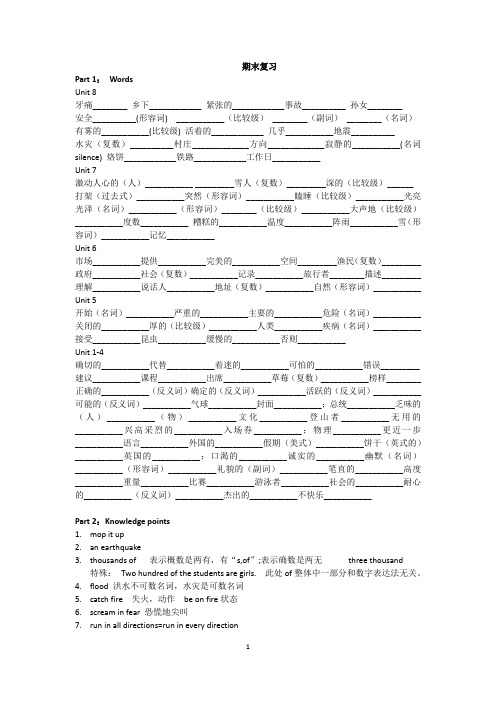
期末复习Part 1:WordsUnit 8牙痛________ 乡下____________ 紧张的____________事故__________ 孙女________安全__________(形容词) ___________(比较级)________(副词)________(名词)有雾的___________(比较级) 活着的____________ 几乎___________地震__________水灾(复数)__________村庄_____________方向_____________寂静的___________(名词silence) 烙饼____________铁路____________工作日___________Unit 7激动人心的(人)___________ _________雪人(复数)_________深的(比较级)______打架(过去式)___________突然(形容词)___________瞌睡(比较级)___________光亮光泽(名词)___________(形容词)________(比较级)___________大声地(比较级)___________度数___________ 糟糕的___________温度___________阵雨___________雪(形容词)___________记忆___________Unit 6市场___________提供___________完美的___________空间_________渔民(复数)_________ 政府___________社会(复数)___________记录___________旅行者________描述_________ 理解___________说话人___________地址(复数)___________自然(形容词)___________ Unit 5开始(名词)___________严重的___________主要的___________危险(名词)___________ 关闭的___________厚的(比较级)___________人类___________疾病(名词)___________ 接受___________昆虫___________缓慢的___________否则___________Unit 1-4确切的___________代替___________着迷的___________可怕的___________错误_________ 建议___________课程___________出席___________草莓(复数)___________榜样________ 正确的___________(反义词)确定的(反义词)___________活跃的(反义词)___________ 可能的(反义词)___________气球___________封面___________;总统___________乏味的(人)___________(物)___________文化___________登山者___________无用的___________兴高采烈的___________入场券___________;物理___________更近一步___________语言___________外国的___________假期(美式)___________饼干(英式的)___________英国的___________;口渴的___________诚实的___________幽默(名词)___________(形容词)___________礼貌的(副词)___________笔直的___________高度___________重量___________比赛___________游泳者___________社会的___________耐心的___________(反义词)___________杰出的___________不快乐___________Part 2:Knowledge points1.mop it up2.an earthquake3.thousands of 表示概数是两有,有“s,of”;表示确数是两无three thousand特殊:Two hundred of the students are girls. 此处of整体中一部分和数字表达法无关。
沪教牛津版初中英语八上教材短语句型知识点汇总

Unit 1 Encyclopaedias读:读两篇摘自一本百科全书的短文。
听:听一个关于“真人百科全书”的广播节目。
语法:学习如何使用some和any。
学习如何使用somebody, anybody,nobdy等词。
说:学习重读句子中的重要单词。
谈论来自一本百科全书的有趣的人或事。
写:完成一个关于小恐龙的小故事。
A.短语归纳1.be born 出生give birth to 生(孩子)2.in the countryside/village 在乡村in the city 在城市3.around the world 全世界all over the world4.for example 例如such as5.more than 多于less than 少于6.human being 人类human7.die out 消失;灭绝8.see the doctorgo to the doctor (去)看医生go to see the doctor9.at the end of 在……末端/尽头by the end of 到……末为止in the end 最后,终于10.be famous for 以……而闻名be famous as 作为……而出名11.some…others… 一些……另一些12.find out 了解;弄清楚13.go for a walk 去散步take/have a walk14.next to=beside 紧挨着;在……旁边15.look like 看起来像……16.break open 破开;裂开break up 打碎;破碎break down 分解;发生故障17.in the centre of… 在……中心18.one day 一天,(将来)某一天some day 总有一天;将来某一天19.learn…from… 从……中学会;向……学习……20.learn about 了解;学到关于……的内容21.be made in+ 地点在某地制造22. a type/kind of… 一种……23.be important to sb. 对某人很重要24.consist of… 由……组成25.be made up of…26.on Earth 在地球上27.by the window 在窗户旁边28. a week later 一周后B.句型归纳1.many+ 可数名词复数许多……much+不可数名词大量……2.like to do sth. 喜欢做某事like doing sth. 喜欢做某事ed to do sth. 过去常常做某事be used to doing sth. 习惯于做某事4.help sb. (to) do sth. 帮助某人做某事help sb. with sth.5.remember to do sth. 记着要做某事remember doing sth. 记得做过某事6.so much+ 不可数名词如此多的……7.make sb. do sth. 使/让某人做某事8. a number of+可数名词复数许多,大量(作主语时,谓语动词用复数)the number of+可数名词复数……的数量(作主语时,谓语动词用单数)9.it+be+adj.(for/of sb.)+to do sth. 做某事(对某人来说)是……的10.as+形容词/副词原形+as 与……一样……11.would like to do sth.want to do sth. 想要做某事feel like doing sth.12.be sure(that)+从句确定C.语法1.some和any2.复合不定代词由some, any, no, every分别与one, thing和body组合即可得到复合不定代词读:读一个关于数字的故事。
沪教牛津版初二上册英语知识点总结全册含习题和答案

沪教牛津版八年级上册英语知识点总结全册(广州地区)Unit 1 Encyclopedias (4)✧ 单词 (4)✧ 短语 (5)✧ 重点句型 (5)✧ 课文翻译 (5)✧ 知识点解析 (7)✧ 习题 (12)Unit 2 Numbers (16)✧ 单词 (16)✧ 短语 (17)✧ 重点句型 (17)✧ 课文翻译 (17)✧ 知识点解析 (18)✧ 习题 (35)Unit 3 Computers (37)✧ 单词 (37)✧ 短语 (37)✧ 重点句型 (38)✧ 课文翻译 (38)✧ 知识点解析 (39)✧ 习题 (46)Unit4 Inventions (50)✧ 单词 (50)✧ 短语 (51)✧ 重点句型 (51)✧ 课文翻译 (52)✧ 知识点解析 (53)✧ 习题 (56)Unit5 Educational exchange (59)✧ 单词 (59)✧ 短语 (59)✧ 重点句型 (60)✧ 课文翻译 (61)✧ 知识点解析 (62)✧ 习题 (70)Unit 6 Ancient stories (73)✧ 单词 (73)✧ 短语 (74)✧ 重点句型 (74)✧ 课文翻译 (75)✧ 知识点解析 (76)✧ 习题 (81)Unit 7 Memory (86)✧ 单词 (86)✧ 短语 (87)✧ 重点句型 (88)✧ 课文翻译 (88)✧ 知识点解析 (89)✧ 习题 (96)Unit 8 English Week (100)✧ 单词 (100)✧ 短语 (101)✧ 重点句型 (101)✧ 课文翻译 (101)✧ 知识点解析 (103)✧ 习题 (107)每单元必考语法点预览Unit 1 some与any的用法& 复合不定代词somebody, anybody, nobody等的用法Unit 2基数词及数字的表达& 序数词Unit 3形容词的比较级与最高级Unit 4 good, bad, far & (not) as…as…Unit 5现在完成时& already, yet, ever, neverUnit 6 现在完成时中since, for & 现在完成时与一般过去时的区别Unit 7(真实性)条件状语从句& if…not 与unlessUnit 8情态动词should, had betterUnit 1 Encyclopedias 单词✧短语1.in the countryside 在乡村,在农村11.for example 例如2.human being 人12.next to 紧挨着3.die out 灭绝,消失13.look up 查阅4.find out 了解,弄清14.live on Earth 生活在地球上5.go for a walk 去散步15.an Italian painter 一位意大利画家6.be born 出生ed to do sth 过去常常做某事7.more than 多于,超过17.at the end of 在…末尾8.just like 正如,正像18.in the centre 在中心9.how long 多久e out of…从…出来10.would like 想要20.be famous for 以…而闻名✧重点句型1.Some dinosaurs were as small as chickens. 有的恐龙和鸡一样小。
(完整)牛津版八年级上册英语语法知识

八年级上英语语法点1) leave的用法1.“leave+地点”表示“离开某地”。
例如:When did you leave Shanghai?你什么时候离开上海的?2.“leave for+地点”表示“动身去某地”。
例如:Next Friday, Alice is leaving for London.下周五,爱丽斯要去伦敦了。
3.“leave+地点+for+地点”表示“离开某地去某地”。
例如:Why are you leaving Shanghai for Beijing?你为什么要离开上海去北京?2) 情态动词should“应该”学会使用should作为情态动词用,常常表示意外、惊奇、不能理解等,有“竟会”的意思,例如:How should I know? 我怎么知道?Why should you be so late today? 你今天为什么来得这么晚?should有时表示应当做或发生的事,例如:We should help each other.我们应当互相帮助。
我们在使用时要注意以下几点:1. 用于表示“应该”或“不应该”的概念。
此时常指长辈教导或责备晚辈。
例如:You should be here with clean hands. 你应该把手洗干净了再来。
2. 用于提出意见劝导别人。
例如:You should go to the doctor if you feel ill. 如果你感觉不舒服,你最好去看医生。
3. 用于表示可能性。
should的这一用法是考试中常常出现的考点之一。
例如:We should arrive by supper time. 我们在晚饭前就能到了。
She should be here any moment. 她随时都可能来。
3) What...? 与Which...?1. what 与which 都是疑问代词,都可以指人或事物,但是what仅用来询问职业。
牛津译林版八年级上册英语知识点归纳(完整版)
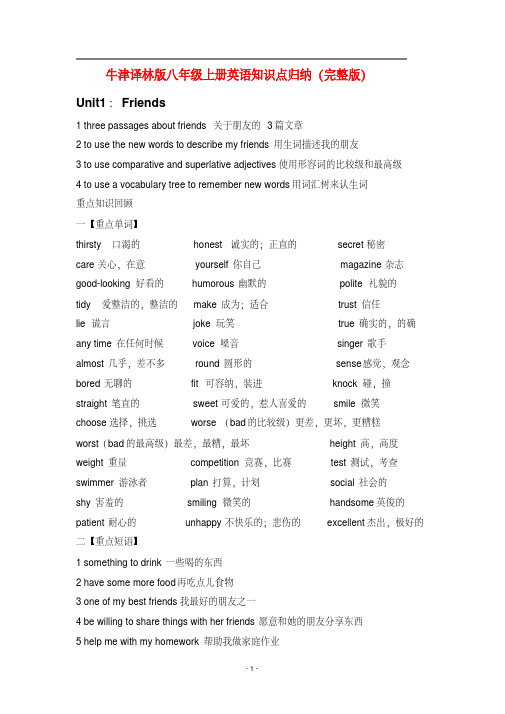
牛津译林版八年级上册英语知识点归纳(完整版)Unit1:Friends1 three passages about friends 关于朋友的3篇文章2 to use the new words to describe my friends 用生词描述我的朋友3 to use comparative and superlative adjectives 使用形容词的比较级和最高级4 to use a vocabulary tree to remember new words 用词汇树来认生词重点知识回顾一【重点单词】thirsty 口渴的honest 诚实的;正直的secret 秘密care 关心,在意yourself 你自己magazine 杂志good-looking 好看的humorous 幽默的polite 礼貌的tidy 爱整洁的,整洁的make 成为;适合trust 信任lie 谎言joke 玩笑true 确实的,的确any time 在任何时候voice 嗓音singer 歌手almost 几乎,差不多round 圆形的sense 感觉,观念bored 无聊的fit 可容纳,装进knock 碰,撞straight 笔直的sweet 可爱的,惹人喜爱的smile 微笑choose 选择,挑选worse (bad的比较级)更差,更坏,更糟糕worst(bad的最高级)最差,最糟,最坏height 高,高度weight 重量competition 竞赛,比赛test 测试,考查swimmer 游泳者plan 打算,计划social 社会的shy 害羞的smiling 微笑的handsome 英俊的patient 耐心的unhappy 不快乐的;悲伤的excellent杰出,极好的二【重点短语】1 something to drink 一些喝的东西2 have some more food 再吃点儿食物3 one of my best friends 我最好的朋友之一4 be willing to share things with her friends 愿意和她的朋友分享东西5 help me with my homework 帮助我做家庭作业6 give her seat on the bus to someone in need 在公共汽车上把她的座位让给有需要的人7 grow up 长大,成长8 make sb. look smart 是某人看上去聪明9 have a good sense of humour 有很强的幽默感10 tell funny jokes 讲有趣的笑话11 walk past our desks 经过我们的课桌12 knock…onto…把……撞到……上13 say a bad word about sb. 讲某人的坏话14 keep a secret 保守秘密15 travel around the world 环游世界16 both my neighbour and my best friend17 feel bored or unhappy 感到无聊或不快乐三【重点句型】1 There’s nothing in the fridge. 冰箱里没有东西2 He tells funny jokes and always makes me laugh. 他讲滑稽的笑话而且总是使我大笑。
2023年广州专用沪教牛津版八年级英语上册主要知识点

广州八年级英语(上册)重要知识点Unit 1 Newspaperseful phrases and expressions Take charge of 主管, 掌管V ote for …投赞成票Take note 记录Be responsible for 负责, 有责任Talk ....over 详谈Make a list of .....把…列成清单Be free for (someone) 对(某人)免费Pay....for 付费Make a decision about....对…作出决定In one week's time 一周后A copy of 一份For free 免费From the air 从空中Of one's own 某人自己旳Have the habit of....有…旳习惯Try one's best 竭力Try to (do something) 竭力(做某事)Try doing something 尝试做某事Believe in oneself 相信自己Once a week 每周一次Be pleased with....对…满意Keep fit 保持健康Have a high fever 发高烧At break 课间休息Not at all 一点也不, 完全不Get on well 相处得好For this reason 由于这样2.语法language: should and ought to (positive)should not and ought not to (negative)3.辨析3.1Other, the other, another(1) Other 表达泛指, 没有特定旳范围。
E.g.Lei Feng always helped other people.(2) The other 意为“另一种”, 一般用于两者之间。
- 1、下载文档前请自行甄别文档内容的完整性,平台不提供额外的编辑、内容补充、找答案等附加服务。
- 2、"仅部分预览"的文档,不可在线预览部分如存在完整性等问题,可反馈申请退款(可完整预览的文档不适用该条件!)。
- 3、如文档侵犯您的权益,请联系客服反馈,我们会尽快为您处理(人工客服工作时间:9:00-18:30)。
8A Unit 1 Friends1. PassageKate is both my best friend and my neighbour. She lives next door. I got to know her ten years ago. Kate is tall and slim. She has square face and a long nose. I like her bright, smiling eyes. They make her look really pretty and kind. She has long hair.Kate is a very clever girl and she likes to help people. She always helps me with my homework. When I feel bored or happy, she talks to me and tells me funny jokes. She always wears a smile on her face and looks happy.2. Word and phrase1)have sth. to drink喝点东西have sth. to eat吃点东西例:If you are thirsty, have something to drink.如果你渴了,就喝点什么吧。
Do you want to have something to drink now?你现在想吃点东西吗?2)make sb.+adj. 表示使某人(怎样)make sb. special:使某人特别例:This song makes him really sad.这首歌使他很悲伤He can always make me happy.他总能让我高兴。
3)get to do sth. 有机会做某事例:Betty and I may not get to see each other often but we will always be best friends.贝蒂和我也学没有机会经常见面,但我们将永远是最好的朋友。
They got to know each other ten years ago.他们十年前认识对方的。
4)would like to be=want to be 想成为……例:I would like to be a social worker when I grow up.我长大了相当社会工作者。
5)wear a smile on one’s face.脸上带着微笑wear在这里表示“面露,面带”例:He always wear a smile on her face and looks happy.他脸上总是带着微笑,看上去很开心6)what we think我们所想的what we do我们所做的what we want我们所要的例:That what we think too.我们也是这么想的。
8)some more:再来一些、更多一些、另外一些例:Can I have some more food?我能再来一些食物吗?9)talk to sb.和某人交谈例:Can I talk to you? 我可以和你说句话吗?10)any time 任何时候例:Any time between seven and nine. 7点到9点任何时间都可以。
Come round any time.什么时候来都可以。
11)in deed:事实上; 实际上; 直正地例:Thanks very much in deed.真是非常感谢。
She always gives her seat to someone in deed.她总是给给真正需要作为的人让座。
12)travel around the world:环游世界例:She wants to travel around the world when she grows up.她长大以后想环游世界。
13)sense of humor.幽默感例:He has a good sense of humor。
他很有幽默感。
14)make sb.+adj:使某人……例:He always makes me laugh.他总是惹我笑。
15)true friend:忠实的朋友例:He is a true friend.他是一个忠实的朋友。
16)worry sb.使某人烦恼,忧虑;困扰某人例:When something worries me,I can always go to her。
当有事情让我烦恼的时候,我总是能去找她。
17)keep a secret:保守秘密例:I can tell her anything because she can keep a secret.我可以告诉她任何事情,因为它能保守秘密。
18)say a bad word about sb:说某人的坏话例:She is kind and never says a bad word about anyone.她很善良并且从来不说人和人的坏话。
19)vote for sb.投某人的票例:Vote for the man you can trust. 选你能信赖的人。
20)have problems with:在……方面有问题例:Every country may have some problems with funny money. 每个国家都有一些伪钞的问题。
21)make friends with sb.和某人交朋友例:I want to make friends with you. 我想和你交朋友。
22)be popular with sb.受某人欢迎例:He is very popular with his students. 他很受学生欢迎。
23) as+形容词/副词的原级+as和…一样…as+形容词/副词的原级+as possible:尽可能……例:The West Lake is as beautiful as a painting. 西湖风景如画Come as early as possible尽可能早来。
3. Grammar形容词、副词的比较级和最高级2、不规则变化原级比较级最高级good(好的)/ well(健康的)better bestbad (坏的)/ ill(有病的)worse worstold (老的)older/elder oldest/eldestmuch/many(多的) more mostlittle(少的) less leastfar (远的)farther/further farthest/furthest8A Unit 2 School Life1. PassageI’m Nancy and I’m 14 years old. I’m in the 9th grade at Rocky Mountain(洛矶山)High School in Denver(丹佛). My brother’s name is Jim. He is 17 years old. He had driving lessons in school last year. Now, he drives me to school every day. This is great because it takes less time than taking the bus.Twice a week, I play softball(垒球) after school. I love this game and I spend a lot of time practicing. Every Monday, I go to a ‘buddy club’, older students talk to new students about school life. I enjoy this a lot. My buddy(搭档) is Julie. She is a senior in 12th grade. She helps me learn all about my new school. She helps me with my homework and listens to my problems too. Julie is my hero(被崇拜的对象).2. Word and phrase1) as well: 也例:We study Chinese, Maths, English and Art as well.我们学习中文、数学、英语,还有艺术2) an article by sb. 某人写的文章例:Yesterday I read an article by Lu Xun.昨天我读了一篇鲁迅写的文章。
3)someone you admire某个你钦佩的人 someone you like 某个你喜欢的人例:It means someone you admire very much.它指的是某个你非常钦佩的人。
4)have (some time) off:休息(一段时间) have two weeks off:休息两周例:Chinese students have weeks off in the summertime than British students.夏季,中国学生比英国学生多休息几个星期。
5)be on TV:上电视(上电视播放或表演节目)例:What will be on TV tonight? 今晚电视上播放什么节目?The twins are going to be on TV next Sunday morning. 那对双胞胎下周日早上要上电视。
6)have time for sth.有时间做某事例:How much time do you have for sports every week? 你每周有多少时间用来做运动?It finishes at 3 p.m. so we will have lots of time for after-school activities.学校下午三点放学,所以我们有很多时间参加课外活动8)go on a trip 去旅行例:They went on a trip to Hong Kong last week.他们上周旅行去了趟香港9)the same size as......与......相同的大小例:My room is the same size as Millie’s. 我的房间与米莉的一样大。
